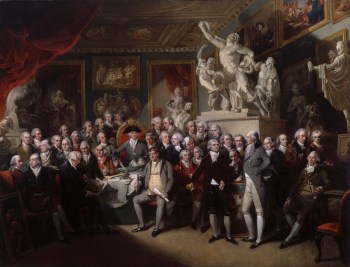John Russell RA (1745 - 1806)
RA Collection: People and Organisations
John Russell was born in Guildford, Surrey, to John Russell, a bookseller, artist and five-times mayor of Guildford, and Ann Parvish. Russell was educated at the local grammar school and showed promise as an artist, winning premiums at the Society of Arts in 1759 and 1760.
Following these successes, Russell was apprenticed to the painter Francis Cotes, who became a friend and mentor. The relationship, mostly happy and supportive, was sometimes strained by Russell’s religious evangelism. Russell had experienced a religious ‘conversion’ in September 1764, which he noted prominently in his diary.
Russell moved to London in 1768, where he took portrait commissions and enrolled at the Royal Academy Schools in 1770. In the same year, he married one of his religious ‘converts’, Hannah Faden (1745-1816) and the couple settled in Cavendish Square in a fashionable part of central London. The couple went on to have 12 children and their religious zeal slowly subsided, although Russell still refused to work on Sundays and left early from social occasions such as Royal Academy dinners for fear of encountering blasphemous behaviour.
During the 1770s, Russell started using pastels in his works which proved extremely popular with London society and resulted in a stream of commissions. He exhibited at the first Royal Academy Annual Exhibition in 1769 and continued exhibiting each year until his death in 1806. In 1770, his work Aquarius won the RA Schools’ gold medal. Russell also published a volume about the art of pastel painting in 1772, Elements of Painting with Crayons.
The success of Russell’s works at the Academy led to numerous commissions, with the artist specialising in ‘fancy’ pictures of children with small animals. He also produced hundreds of portraits, exhibiting 21 at the Academy in 1790 alone.
Russell was elected an Associate of the Royal Academy in 1772 and a full Academician in 1788. He became painter to King George III and to the Prince of Wales, an appointment stemming from the positive reception of his portraits of the King’s physician and of Queen Charlotte. This royal patronage combined with his own prolific output earned Russell considerable wealth during his lifetime and he also inherited a small freehold estate in Dorking, Surrey, from a cousin.
Russell was also an astronomer, from his youth taking a keen interest in the study of moons and planets which resulted in the most accurate and detailed picture of the moon to date.
From 1800 Russell suffered a number of injuries and illnesses, including a bout of cholera in 1803 which left him deaf. In spite of this, in the same year he painted his largest pastel picture, Lady Johnstone and her Family and a Greyhound.
Russell died of typhus in 1806 while staying in Hull.
RA Collections Decolonial Research Project - Extended Biography
John Russell painted several portraits of William Wilberforce, philanthropist and campaigner for the abolition of the slave-trade. The earliest of these portraits was made when Wilberforce was eleven years old in 1770, staying at his aunt’s house in Richmond (see Note 1). Another portrait made in 1801 (now in Leeds Art Gallery), shows the adult Wilberforce holding a rolled piece of parchment which may be the Slave Trade Abolition Act, which received royal assent in 1807 (See Note 2).
Russell also painted a portrait of the poet, writer and anti-slavery activist, William Cowper (1731-1800).
Russell was a fervent Methodist, a denomination that was generally opposed to enslavement and the trade of enslaved Africans, following their founder, John Wesley (1703-1791). Wesley was vocal against enslavement, publishing pamphlets against the institution and campaigning for its abolition.
For more information on this research project, please see https://www.royalacademy.org.uk/article/ra-collections-decolonial-research
Notes
https://www.npg.org.uk/collections/search/portraitExtended/mw06771/William-Wilberforce (accessed 14 March 2022).
Ibid.
Relevant ODNB entries
Walker, R. J. B. “Russell, John (1745–1806), portrait painter and astronomer.” Oxford Dictionary of National Biography. 23 Sep. 2004; Accessed 31 Mar. 2022. https://www-oxforddnb-com.lonlib.idm.oclc.org/view/10.1093/ref:odnb/9780198614128.001.0001/odnb-9780198614128-e-24321
Baird, John D. “Cowper, William (1731–1800), poet and letter-writer.” Oxford Dictionary of National Biography. 23 Sep. 2004; Accessed 4 Apr. 2022. https://www-oxforddnb-com.lonlib.idm.oclc.org/view/10.1093/ref:odnb/9780198614128.001.0001/odnb-9780198614128-e-6513
Rack, Henry D. “Wesley (Westley), John (1703–1791), Church of England clergyman and a founder of Methodism.” Oxford Dictionary of National Biography. 23 Sep. 2004; Accessed 4 Apr. 2022 .https://www-oxforddnb-com.lonlib.idm.oclc.org/view/10.1093/ref:odnb/9780198614128.001.0001/odnb-9780198614128-e-29069
Profile
Born: 29 March 1745 in Guildford, Surrey, England, United Kingdom
Died: 20 April 1806
Nationality: British
RA Schools student from 17 March 1770
Elected ARA: 2 November 1772
Elected RA: 10 March 1788
Gender: Male
Preferred media: Painting and Pastel
Works by John Russell in the RA Collection
3 results
Works after John Russell in the RA Collection
3 results
Works associated with John Russell in the RA Collection
2 results
Associated books
3 results
-
Revd. Richard Cecil
Memoirs Of The Late John Bacon, Esq. R.A. - By The Rev. Richard Cecil, M.A. Late Rector Of Bisley, And Vicar Of Chobham, Surrey; And Minister Of St. John's-Chapel, Bedford-Row, London. - A New Edition. - - London:: 1811.
07/4753
-
Voyage Du Jeune Anacharsis En Grèce, Dans Le Milieu Du Quatrième Siècle, Avant L'Ère Vulgaire. - En Trois Volumes. - Tome I. (- III.) - - À Londres:: [1796]
07/4023
-
George C. Williamson
John Russell, R.A. / by George C. Williamson ; with an introduction by Lord Ronald Gower - London: [1894]
08/1048
Associated archives
6 results
-
W[illiam] B[aillie], Calcutta, to Ozias Humphry
4 Oct 1795
Item HU/4/112
-
Manuscript note on 1795 exhibit #294, by John Russell
1795
Item AND/9/118
-
Manuscript providing suggestions for the identities of 1795 portrait exhibits between #212 and #280
[1795]
Item AND/9/111
-
Anderdon's biograhical notes on John Russell
22 Jun 1862
Item AND/7/71







